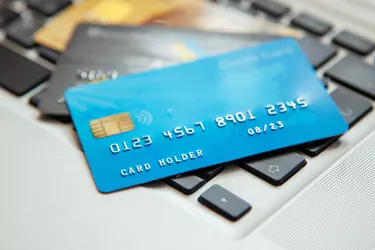
If you're diligent about protecting your financial information from identity theft -- and you should be -- ensure that any credit card receipts reveal as little data as possible. That's one reason federal law -- specifically the Fair and Accurate Credit Transaction Act -- stipulates that information on receipts must be truncated, including the credit card expiration date. If you receive a credit card slip that includes the expiration date and subsequently are the victim of credit card fraud, you may have grounds to sue. Consult an attorney for more information. Lawyers have filed class action suits nationwide against retail establishments which fail to upgrade equipment for credit card receipt information.
Warning
The class action suits allege "intentional" statute violations by not upgrading equipment, so the plaintiffs usually sue for punitive damages for every violation.
Video of the Day
Fair and Accurate Credit Transaction Act
The 2003 Fair and Accurate Credit Transaction Act, an amendment to the Fair Credit Reporting Act, has been in effect for all merchants since December 2006. The Federal Trade Commission oversees law enforcement on businesses in noncompliance with the FACTA. Such businesses may face damages ranging between $100 and $1,000 for each receipt. That's a lot of money for leaving a credit card expiration date on a receipt, especially if those receipts total in the thousands.
Video of the Day
Tip
This law applies only to those receipts printed electronically, not written by hand.
Expiration Dates
You may wonder why credit card expiration dates are even necessary. Reasons for the expiration date include:
- Another piece of information for fraud prevention
- An opportunity to notify customers of new benefits and promotions
- The chance to replace cards with worn-out magnetic strips
Most credit cards expire on the last day of the month printed on them. A card expiring 12/16, for example, generally is good until December 31, 2016. However, credit card expiration dates are left to the issuer's discretion, so it's important to understand your individual card's terms. You should find the information on the issuer's website or call the card's toll-free number and ask a representative.
Not Necessarily Expired
If you're making online or in-store purchases, you can use your card until the last day of the month in which it expires. However, it's possible that automatic payments set up on the card may continue going through beyond that date. If that happens -- and you don't owe the money -- try disputing the charge with the company processing the automatic payments. The opposite situation is more likely to occur, in that a company that doesn't receive the new expiration date and cuts off an automated service. T
Retailer Cards
While bank cards such as MasterCard and Visa and network cards such as Discover and American Express all use expiration dates, that's not the case with cards issued by retailers. You only can use those cards at that particular retailer, so the possibility of fraud lessens. It saves the companies money if they no longer have to send out cards to replace those expiring.